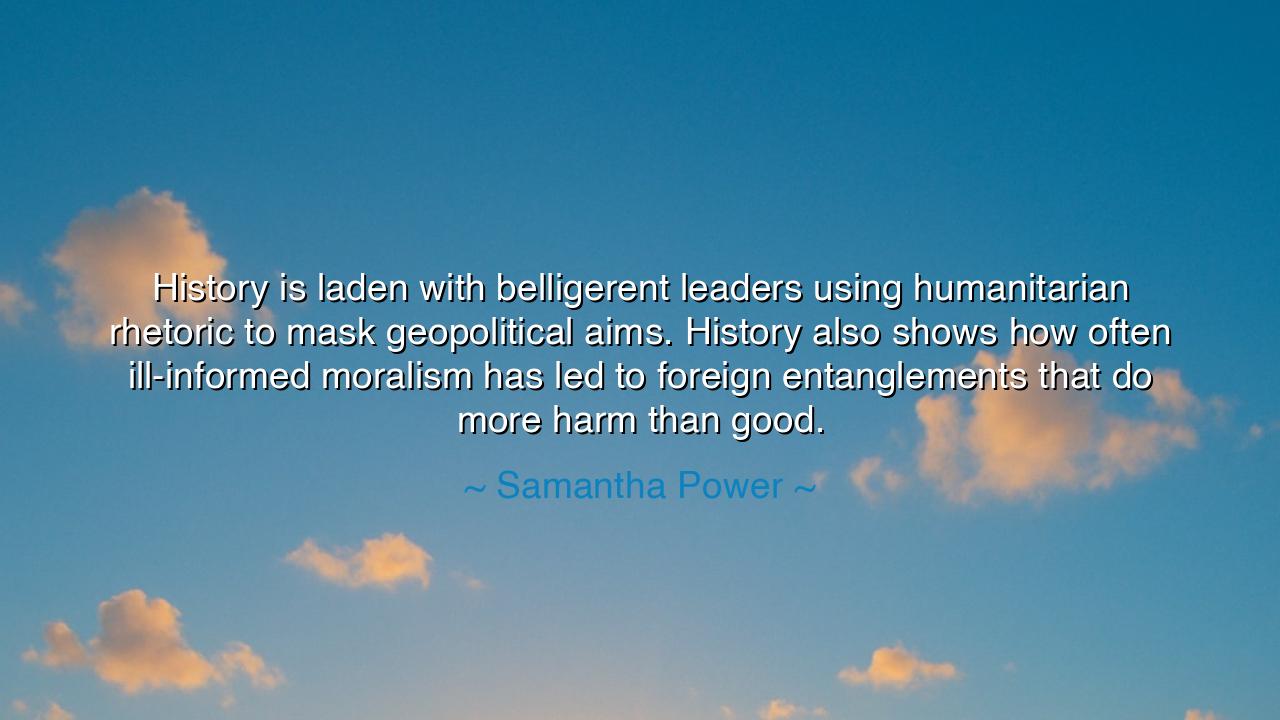
History is laden with belligerent leaders using humanitarian
History is laden with belligerent leaders using humanitarian rhetoric to mask geopolitical aims. History also shows how often ill-informed moralism has led to foreign entanglements that do more harm than good.






“History is laden with belligerent leaders using humanitarian rhetoric to mask geopolitical aims. History also shows how often ill-informed moralism has led to foreign entanglements that do more harm than good.” – Samantha Power
In these sobering and incisive words, Samantha Power, diplomat, scholar, and chronicler of human struggle, speaks to one of the oldest and most tragic patterns in human history — the misuse of morality as a weapon, and of compassion as disguise. When she warns that history is filled with belligerent leaders cloaking their ambition in the language of virtue, she exposes a truth as ancient as empire itself: that power often masquerades as goodness, and that nations, like men, are most dangerous when they believe themselves righteous without reflection. Hers is a voice of experience and warning — for Power, who served in the halls of diplomacy and studied the horrors of genocide, saw firsthand how easily moral rhetoric can be twisted into justification for domination.
The origin of this quote lies in Power’s long examination of intervention and responsibility. As the author of A Problem from Hell, she explored the world’s repeated failure to stop atrocities — from Armenia to Rwanda — and the bitter tension between moral duty and political consequence. Yet even as she championed the need for nations to act against evil, she came to see that good intentions, unguided by wisdom, can unleash destruction as grave as the evil they sought to end. Thus her warning is twofold: beware the tyrant who speaks the language of mercy, and beware the zealot who acts without understanding. For both can turn the banner of humanitarianism into a flag of conquest.
The annals of time are heavy with examples of this deception. Consider the Crusades, launched under the cry of saving souls and liberating holy lands. Cloaked in the light of faith, they brought centuries of bloodshed and bitterness. Kings and popes spoke of God’s will, yet beneath their words lay the hunger for land, glory, and gold. The people believed they fought for heaven; their leaders fought for dominion. The result was not salvation, but centuries of violence, born from the union of conviction and ignorance. And so Power’s words echo through the ages: even the language of holiness can be bent to serve the will of conquest.
Nor is this danger confined to the distant past. In the modern age, too, nations have claimed the mantle of moral duty while pursuing geopolitical advantage. Wars have been waged in the name of freedom that left lands in ruin, and interventions justified by compassion have sown seeds of chaos. The powerful, seeking to expand their influence, have learned to speak in the tones of virtue — promising liberation, while binding others in dependence. And those who, driven by shallow moral fervor, rush into foreign conflicts without understanding their complexity, often find themselves creating the very suffering they sought to prevent. Power’s insight cuts to the heart of this paradox: moralism without humility is a form of arrogance, and arrogance dressed as goodness can destroy as surely as malice.
Yet her message is not one of cynicism, but of discernment. Samantha Power does not tell us to abandon compassion; she tells us to ground it in wisdom. For there is a difference between moral courage and moral vanity. True moral courage asks not only, “What is right to do?” but also, “What will this act bring forth?” It seeks understanding before action, cooperation before conquest, and truth before triumph. The wise do not turn away from the suffering of others, but neither do they presume that their will alone can heal the world. To act well, one must first see clearly — and to see clearly, one must be humble before history.
There is a lesson here drawn from the story of Athens, that great beacon of democracy which, in its pride, fell into ruin. Believing itself the teacher of justice to all men, Athens waged war upon its neighbors, claiming to bring civilization where it conquered. Its leaders spoke the language of enlightenment, yet their ambition devoured their virtue. In the end, Athens was undone not by foreign enemies, but by the blindness of its own moral arrogance. So too, Power warns, will any nation or leader fall who confuses domination with duty, or who acts in ignorance while claiming to act in righteousness.
And so, my child of conscience and reason, take this teaching into your heart: do not mistake passion for wisdom, nor rhetoric for truth. When you hear the call to act in the name of justice, pause and ask — who speaks, and to what end? Be wary of those who speak of peace while seeking power, and of those who rush to save without understanding the lives they touch. Remember that compassion must be informed, and that moral strength is born not from certainty, but from humility.
For as Samantha Power reminds us, history is laden with those who have done great harm believing they did great good. Let your heart burn for justice, but let your mind guard it with wisdom. Act, but act with understanding. Speak, but speak with truth. And let every deed you do for the sake of humanity be guided not by pride, but by the quiet light of discernment — for only then can goodness endure, and the errors of history be transformed into the wisdom of the future.






AAdministratorAdministrator
Welcome, honored guests. Please leave a comment, we will respond soon